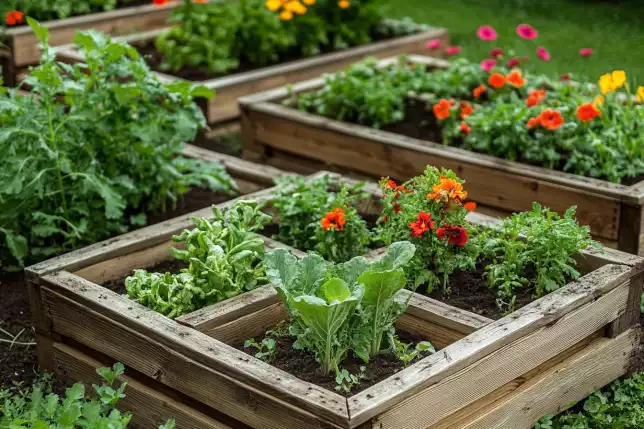Companion planting is an effective way to create a thriving vegetable garden. By strategically pairing plants, you can improve growth, deter pests, attract pollinators, and enhance soil health. This guide will walk you through the best companion plants and how to use them to promote a productive and healthy vegetable garden.
1. Introduction to Companion Planting
What Is Companion Planting?
Companion planting is the practice of growing different plants together to promote mutual benefits. Certain plant pairings can deter pests, attract pollinators, and even improve soil health, resulting in stronger, healthier plants.
Benefits of Companion Planting
- Pest Control: Certain plants repel pests naturally, reducing the need for chemical treatments.
- Improved Pollination: Companion plants attract pollinators like bees and butterflies, which helps increase vegetable yields.
- Better Yields: Well-matched plants can enhance each other’s growth and productivity, leading to a more bountiful harvest.
- Healthier Plants: By balancing the garden ecosystem, companion planting helps reduce disease and improve overall plant health.

2. Companion Planting Strategies for Popular Vegetables
Best Companion Plants for Tomatoes
Tomatoes benefit from companions that repel pests and improve growth.
- Best Plants: Basil, marigolds, and carrots.
- Benefits: Basil repels insects like aphids, while marigolds deter nematodes.
Best Companion Plants for Peppers
Peppers thrive when planted with herbs and flowers that deter pests and enhance soil health.
- Best Plants: Basil, onions, and marigolds.
- Benefits: Basil improves flavor and repels insects, while onions ward off pests like aphids and mites.
Best Companion Plants for Cucumbers
Cucumbers benefit from plants that improve growth and protect them from disease.
- Best Plants: Dill, nasturtiums, and beans.
- Benefits: Dill attracts beneficial insects, while nasturtiums deter aphids and beetles.
Learn more about growing cucumbers successfully here.
Companion Plants for Beans
Beans improve soil health by fixing nitrogen, making them a great companion for many vegetables.
- Best Plants: Corn, squash, and marigolds.
- Benefits: Corn provides natural support for bean vines, while squash helps to retain moisture.
Companion Plants for Onions
Onions benefit from companion plants that protect them from pests and enhance growth.
- Best Plants: Carrots, lettuce, and tomatoes.
- Benefits: Carrots improve soil aeration, while tomatoes help keep pests away from onions.
3. Companion Planting with Herbs and Flowers
Using Herbs as Companion Plants
Herbs play a significant role in companion planting, as they attract beneficial insects and repel harmful ones.
- Best Herbs: Basil, thyme, and dill.
- Benefits: Basil repels flies and mosquitoes, while dill attracts pollinators like bees and beneficial insects.
Flowers That Benefit Your Vegetable Garden
Certain flowers not only add beauty but also offer functional benefits in a vegetable garden.
- Best Flowers: Marigolds, nasturtiums, and sunflowers.
- Benefits: Marigolds deter pests such as nematodes, while nasturtiums keep aphids and whiteflies at bay.

4. Companion Plants That Serve Multiple Purposes
Plants That Deter Pests
Some plants naturally repel pests, making them valuable additions to your garden.
- Best Plants: Garlic, marigolds, and chives.
- Benefits: Garlic repels aphids, while marigolds keep nematodes and beetles away.
Plants That Attract Pollinators
Attracting pollinators is essential for the success of many vegetable plants.
- Best Plants: Lavender, borage, and calendula.
- Benefits: These plants draw bees and butterflies, helping to improve pollination and increase yields.
Plants That Provide Shade
Tall plants can provide shade for more delicate vegetables that prefer cooler conditions.
- Best Plants: Corn, sunflowers, and okra.
- Benefits: Corn and sunflowers can offer protection from the sun for leafy greens like lettuce.
5. Common Companion Planting Mistakes to Avoid
Plants That Don’t Grow Well Together
Not all plants make good companions. Some pairings can hinder growth or attract pests.
- Avoid: Onions with beans, as onions can stunt bean growth.
- Avoid: Tomatoes with potatoes, as they are prone to similar diseases.
6. Companion Planting Chart for Quick Reference
Vegetables and Their Best Companions
Here’s a quick-reference chart to help you pair your vegetables with the right companions:
| Vegetable | Best Companion Plants |
|---|---|
| Tomatoes | Basil, marigolds, carrots |
| Peppers | Basil, onions, marigolds |
| Cucumbers | Dill, nasturtiums, beans |
| Beans | Corn, squash, marigolds |
| Onions | Carrots, lettuce, tomatoes |
For additional guidance, see this complete companion planting guide here.
7. Frequently Asked Questions (FAQs) About Companion Planting
Q: How does companion planting improve vegetable yields?
A: Companion planting enhances soil health, improves pollination, and helps deter pests, all of which contribute to better yields.
Q: What are the best companion plants for controlling pests naturally?
A: Marigolds, basil, and garlic are excellent at repelling a variety of garden pests.
Q: Can companion planting work in small gardens or raised beds?
A: Yes, companion planting is ideal for small spaces like raised beds since you can maximize plant relationships even in limited areas.
Conclusion
Create a Balanced, Thriving Garden
By incorporating companion plants into your vegetable garden, you can promote healthier plants, deter pests, and improve yields. With careful planning and the right combinations, your garden can thrive naturally without the need for chemicals.
Start Your Own Companion Planting Garden
Whether you have a small raised bed or a large garden plot, companion planting can help you grow healthier, more productive crops. Get started today and enjoy a thriving vegetable garden!


1 thought on “Best Companion Plants for a Thriving Vegetable Garden”